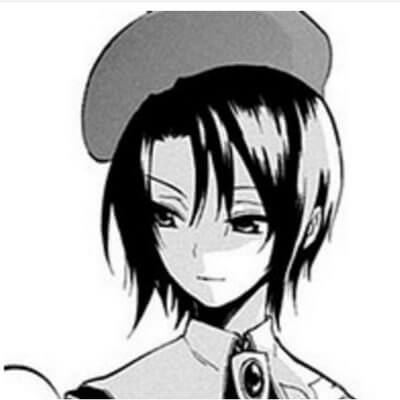This is a personal diary entry.
It is meant for a limited audience of friends and strangers interested in the same interests as I am.
More importantly, please consider it just like you would if this were a physical diary —the writing here is entirely personal and subjective. I write entries like this for myself first, though I do find it fun to open up to a limited audience online too. But that’s all there is to it!
It’s been 5 years since I first started seeing everyone in the visual novel community rave about the House in Fata Morgana. In a Discord server I’m in, many people read it over summer 2016 and summarised their experience with “suffering”. Since then, as the fame of the VN kept increasing, I’ve learnt of so many aspects I would be sure to enjoy: Gothic horror, a metatextual layer, an historical setting, thematic similarities with Umineko… yet as always I’ve been putting off reading it for no particular reason at all.
Part of the reason why is that I grew distantly familiar with the story through mere osmosis: a couple times due to accidental spoilers, but mostly because of the sheer number of people I know and follow online who love it and talk about it a good deal.
From bits and pieces there, I started to unconsciously build up a version of the story in my mind which went more or less like this:
A bunch of assumptions I had about Fata Morgana before starting (including some major spoilers)
I assumed that Fata Morgana would be a love story between Jacopo and Morgana, told through a number of interconnected stories, with a frame story connecting them. I thought that the person listening to the story was Jacopo and that Morgana, the witch, would be the narrator, who'd wish to enact some kind of revenge on him for killing her.
I was familiar from the start with the names of many characters but had no idea in what context they would intervene.
I assumed the house would be kind of magical, and maybe that its true location wouldn't be so straightforward to understand. A friend once wondered if I would get certain 'clues' more easily because I come from France?
I knew the individual stories making up Fata Morgana would take place in different time periods. I assumed there would be reincarnation shenanigans.
I’m sure a lot of these expectations are fairly mistaken, or lack context to make sense, but I prefer being honest with myself before going further!
I’m not necessarily too concerned about spoilers of stories I know nothing or little about, but it’s very different once you start building passing, ongoing familiarity with a work from the outside, before having a chance to experience it on your own terms. It can make it very daunting to approach.
I think a lot of VN fans feel like this towards Umineko because of its fame, and it’s also why I try to be gentle with my love for it when discussing it with other people —I’ll gladly talk to anyone about it, especially when I feel like they have some interest in mystery or intergenerational family drama, but I’d hate for anyone to feel obliged to read or like it either. Ironically, I think it’s assumptions that I myself carry over from Umineko which led me to build a whole rendition of Fata Morgana in my mind, instead of allowing it to be its own story too, ahaha.
With that out of the way, I’m very glad to say I finally managed to push beyond these vague expectations and to start reading the story! I’ve been using the recent Switch release.
It’s been really, really nice so far and I thought I’d use this blog to give occasional updates on my progress! I’ve never really done this but it could be fun.
These aren’t going to be in-depth reviews or anything. Consider these posts like the informal readthroughs you may see on Twitter or Discord, except I write up summaries after finishing chapters instead of livetweeting. I apologise if the tone’s off sometimes!
Also, please keep in mind the assumptions I started with and mentioned above —even if they end up completely inaccurate, I’ll have them on my mind throughout my read, so I may accidentally refer to upcoming reveals I’ve heard about when figuring out everything.
Since this article is long because of screenshots, I’ve added a table of contents on the left sidebar (on the top menu if you’re on mobile).
Prologue
The prologue played out much as I expected it to! I knew the basic premise of the Maid waking up an amnesiac Master.
The prose is really, really nice to read, and suitably atmospheric. I think I remember reading somewhere about some of the deliberate translation choices in terms of style, e.g trying to evoke certain kinds of antiquated, Gothic prose. It definitely works well —I’ll try and find those comments from the translator again later.
First Door
That was very, very good… I fell in love with everything about this door. Unfortunately I did not take many screenshots, but really everything about it was just excellent.
The Maid makes it clear from the start that this tale won’t have a happy ending, and that innocence will be lost. All I could ever ask for! I got suspicious about Nellie liking Mell from that first scene and yeah… it turned out as well as it could have.
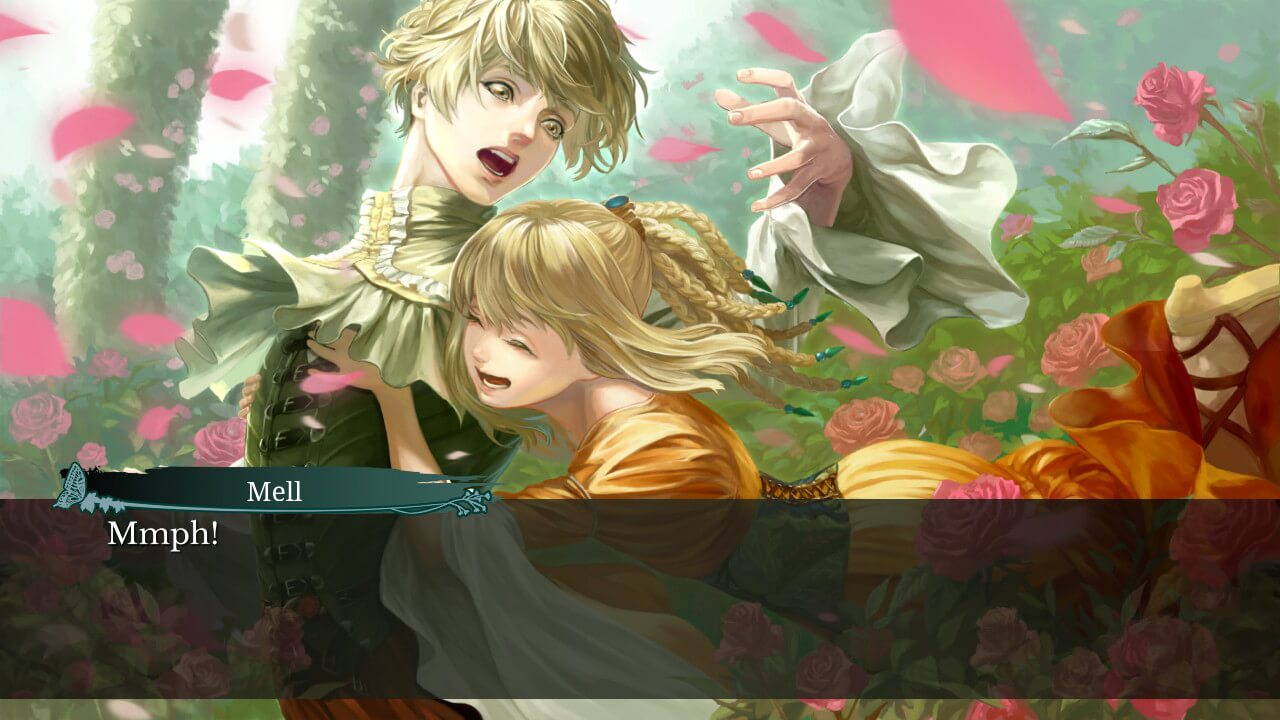 They look so happy but… this is going to be a tragedy from the start, isn’t it?
They look so happy but… this is going to be a tragedy from the start, isn’t it?
Mell is a nice protagonist. A bit of an oblivious, somewhat self-centered young aristocrat, who still mostly means well, but doesn’t necessarily get it, but that’s part of his charm! It was fun to follow his downfall.
I like the backgrounds of this time period a lot! I think most ared based on actual photographs, right? They’re so heavily processed it’s hard to tell sometimes, but the result is very fairytale-like and charming.
It seems the Maid is intentional about obscuring the exact location of the manor at the time of the flaxen-haired family. From the backgrounds, and from part of the musical atmosphere, I initially guessed Spain or Portugal (I vaguely recall once hearing about Portugal in the context of Fata Morgana too, may be mistaken), but Nellie’s mention of watching Shakespeare at the Globe theater suggests otherwise. I didn’t try to do any research myself to see if Elizabethan England fitted with the other hints dispersed throughout the narrative, but I’m going to assume they do.
Nellie’s birthday party is an excellent scene! I have a thing in fiction for scenes set in large social gatherings, and it works really well. Poor Nellie though, her brother can never fully empathise with her, but I’m glad she gets to dance with him.
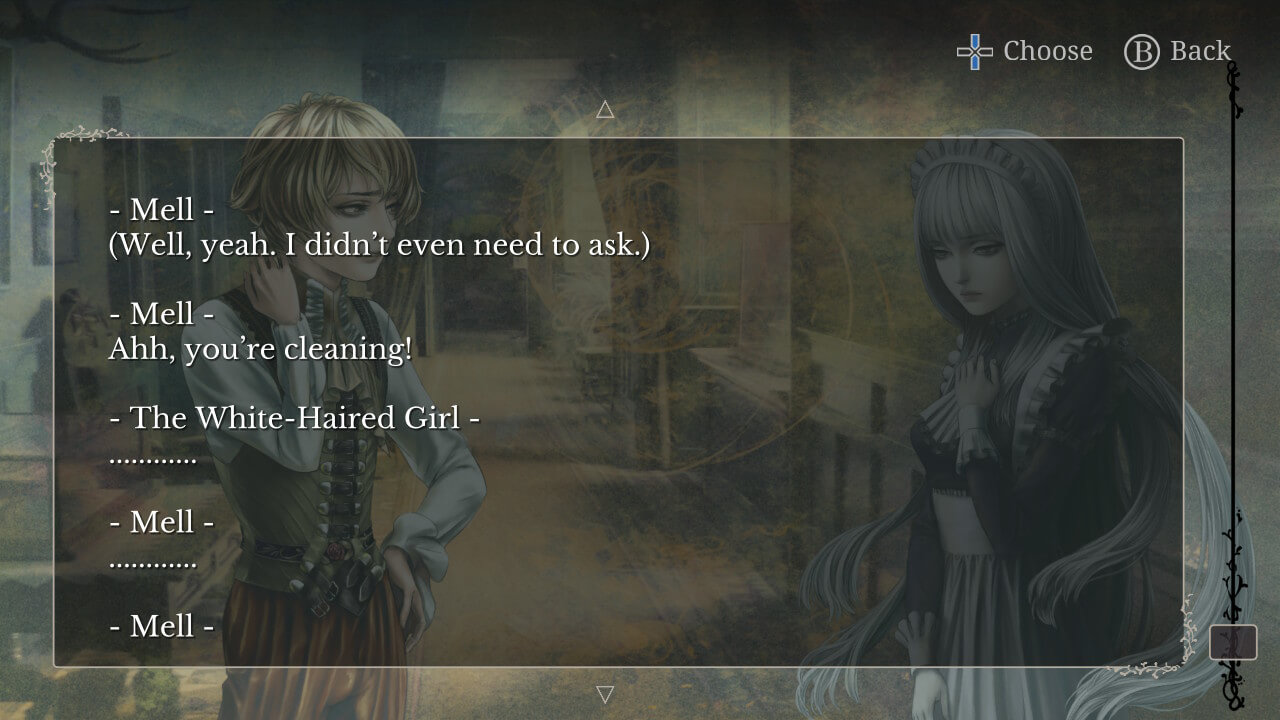 Mell’s flirting approach is one for the ages.
Mell’s flirting approach is one for the ages.
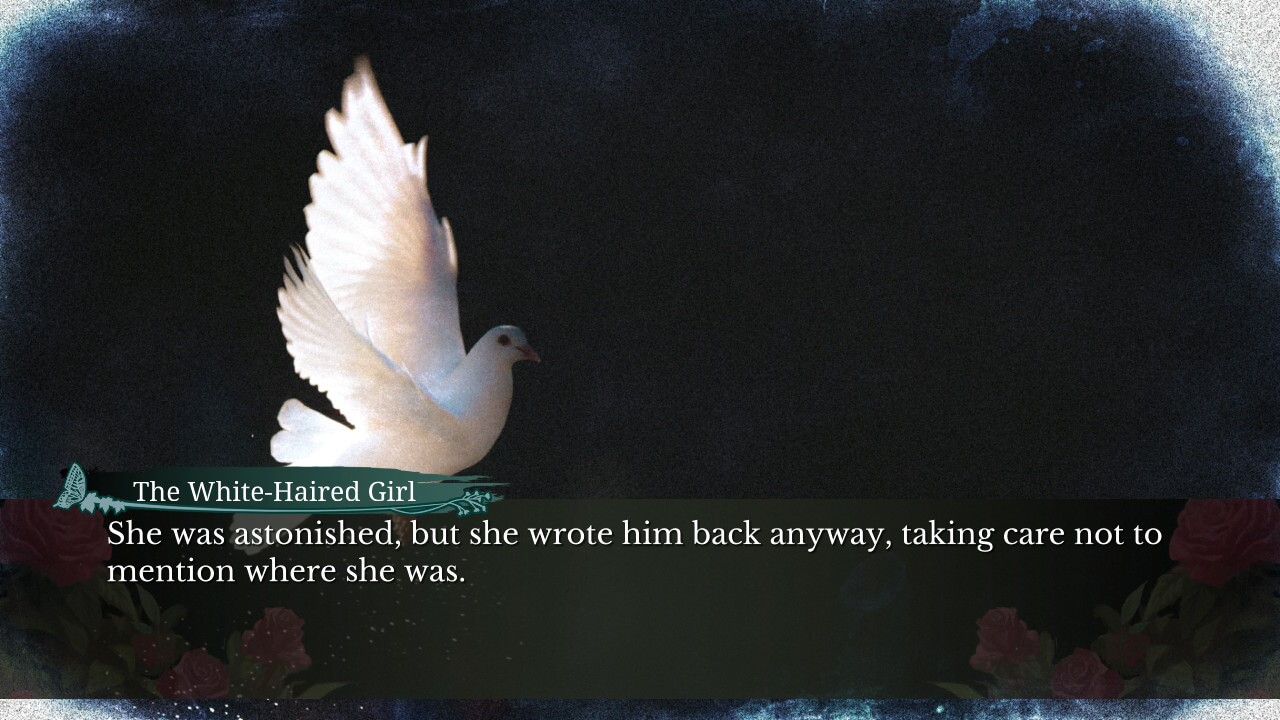
I really like pretty much everything about the romance between Mell and the “white-haired girl” (she isn’t named, but due to her character archetype and witch references, I can only assume her name is Morgana). It’s a very endearing rags-to-riches fairy tale, and there is definitely something very sweet in Mell’s awkward but firm adoration. The background of the white-haired girl is super intriguing as well; I like her tale about the girl locked in the tower a lot.
Nellie is obviously a highlight! You can tell from afar that her infatuation won’t end well, without knowing how or when.
Which leads me to the climactic opera scene which is so hard to read through. It has everything, the hope for the white-haired girl, the Cinderella dress, and the creeping feeling it will all go wrong.
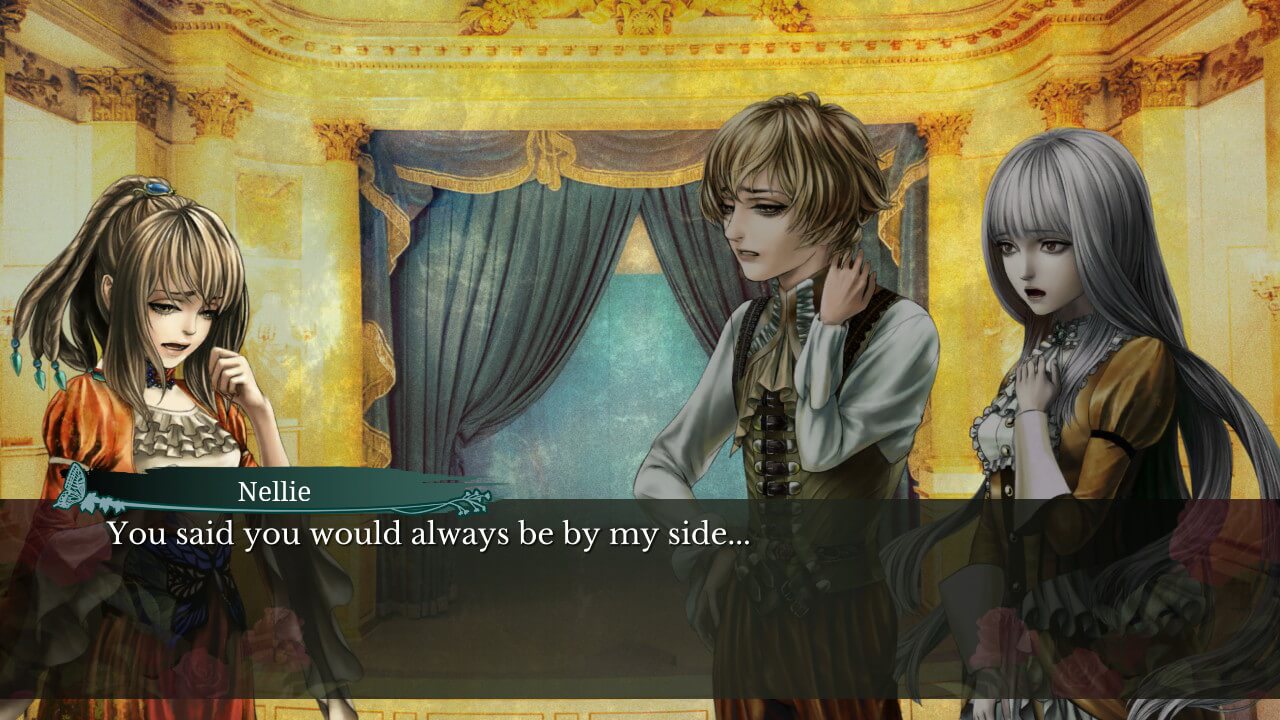
I didn’t take any screenshot of Mell’s angry pose at his sister, but… I can’t help but feel horrified at him, all the while understanding why he was protecting the one he loved. It’s sad that he was able to choose the path he wanted out of life, to say he would do anything to marry the one he loved, even in spite of her family background, but that Nellie was never afforded the same choice in the first place because she was a girl. And it hurt that he isn’t able to see this injustice. Of course he’s not responsible for the events of the following night… But it’s still so, so well-done.
The events from the following night are… well, they are what they are.
It’s been a little while now, so my initial reactions have faded from memory a bit, but I definitely didn’t expect that painting twist. I like the theme of forbidden relationship and fate a lot —no wonder that Nellie couldn’t bear to see the brother she loved fall in love with his half-sister. I have lots of questions about the painter father of the white-haired girl, wonder whether he has true divination gift, and if we’ll see him again in the future. Likewise for the white-haired girl, it seems like events following that night could lead to a true witch transformation, and maybe to a revenge later on. It seems like there might be more to the painting than just revealing the girl’s true lineage.
Overall, door 1 is a very, very enjoyable tragedy. I really like its atmosphere of courtly aristocratic love, and the way it plays with fairy-tale and tragic archetypes —the hidden heir, the girl locked in the tower, Cinderella. It makes you hope for the best, all the while reminding you that you will not get a happy ending.
It is super interesting to see the Maid spell out the moral of the tale explicitly to the Master. Mell wants to embody a prince and to devote himself to the one he loves no matter the cost, but fails to notice what’s happening in the background with his sister, or to discover the girl’s lineage in time, causing his ruin. Even at the very end, he seems to refuse the truth revealed by the painting —that he loves his half-sister. He certainly means well… but that isn’t enough. Perhaps a perfect happy ending was always impossible. Being able to grasp your happiness but seeing it escape from you is grade-A tragedy.
Overall, getting to root for the happiness of the characters you like, all the while understanding perfectly well in what way they about just come short is a very enjoyable kind of suffering… Thank you Fata Morgana.
I feel like rereading through this tale because I missed a lot of tiny details. At least it’s been a few days since I read so I forgot much of the thoughts I had while reading.
Second Door
More suffering! Ditch Cinderella, we’re going Beauty and the Beast this time!
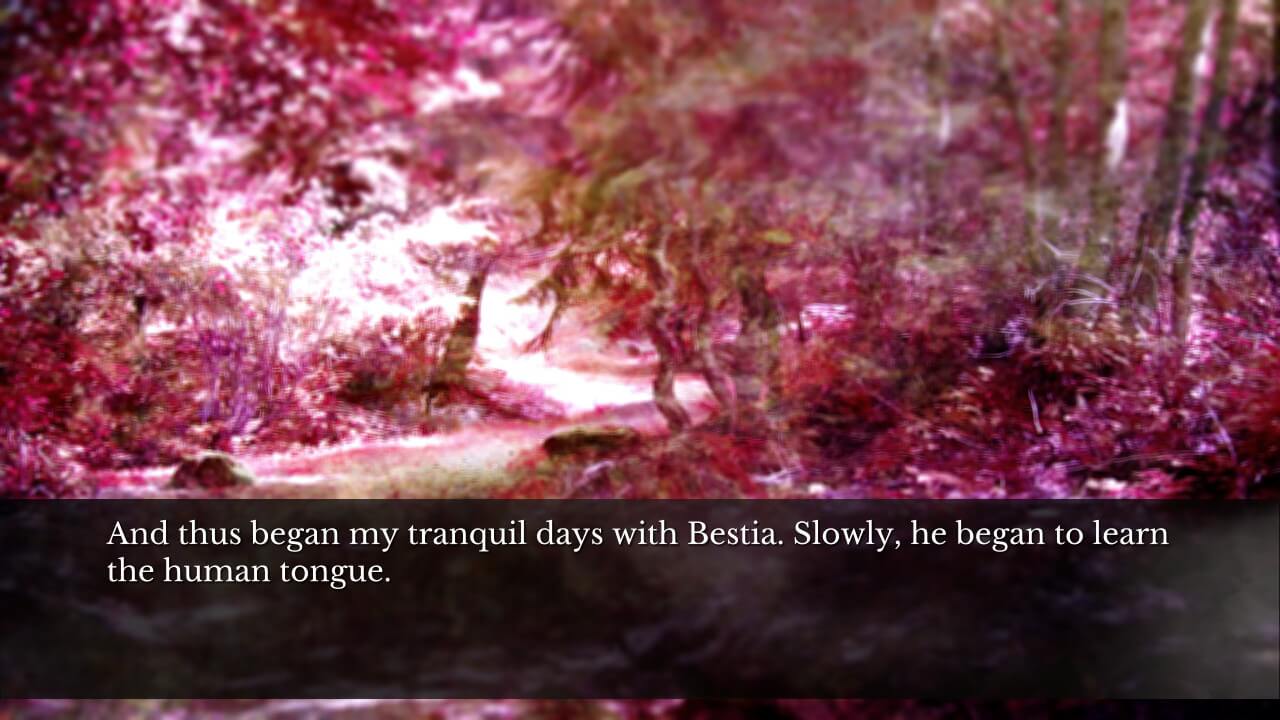
As I suspected, the manor is a magical entity and seems to switch locations throughout eras. So perplexing, there was definitely no mention of the manor overlooking the sea in door 1. And as expected, the Maid is seemingly immortal, but without a Master, she seems to wither. Interesting…
I definitely couldn’t guess the new location of the manor from the start at all, but I eventually assumed Spain from the mention of the word bestia and of local oranges.
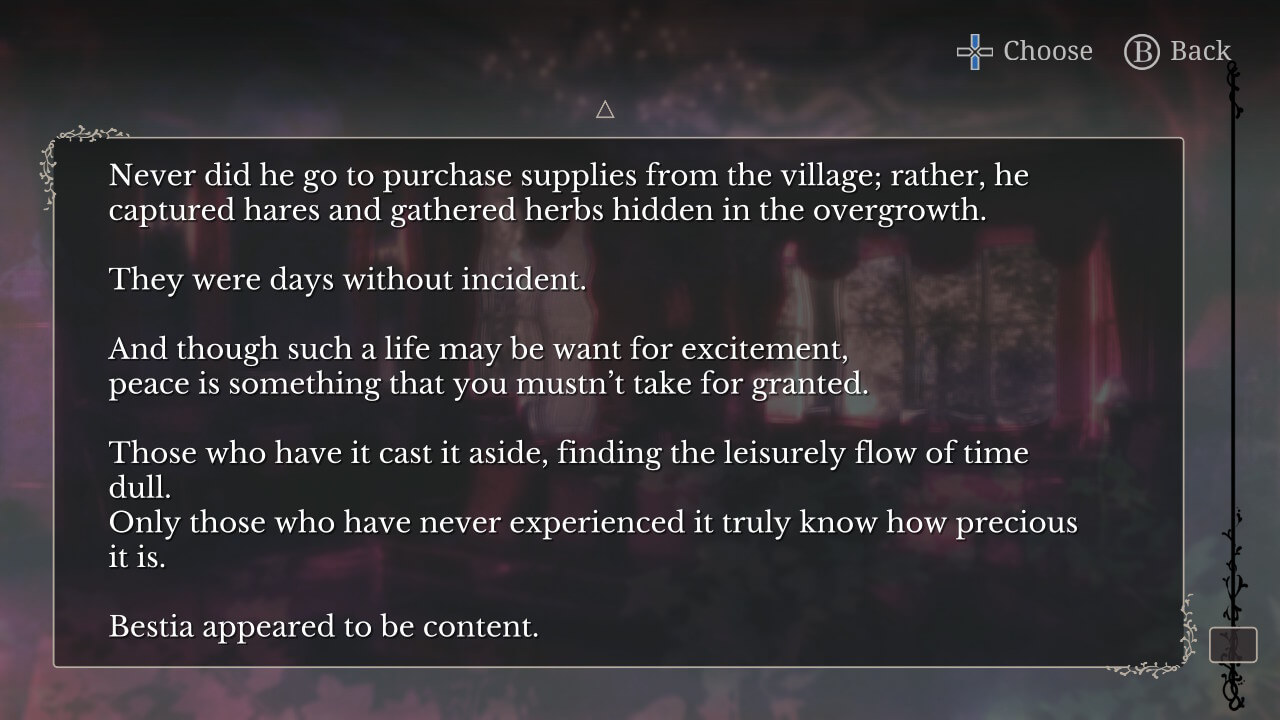
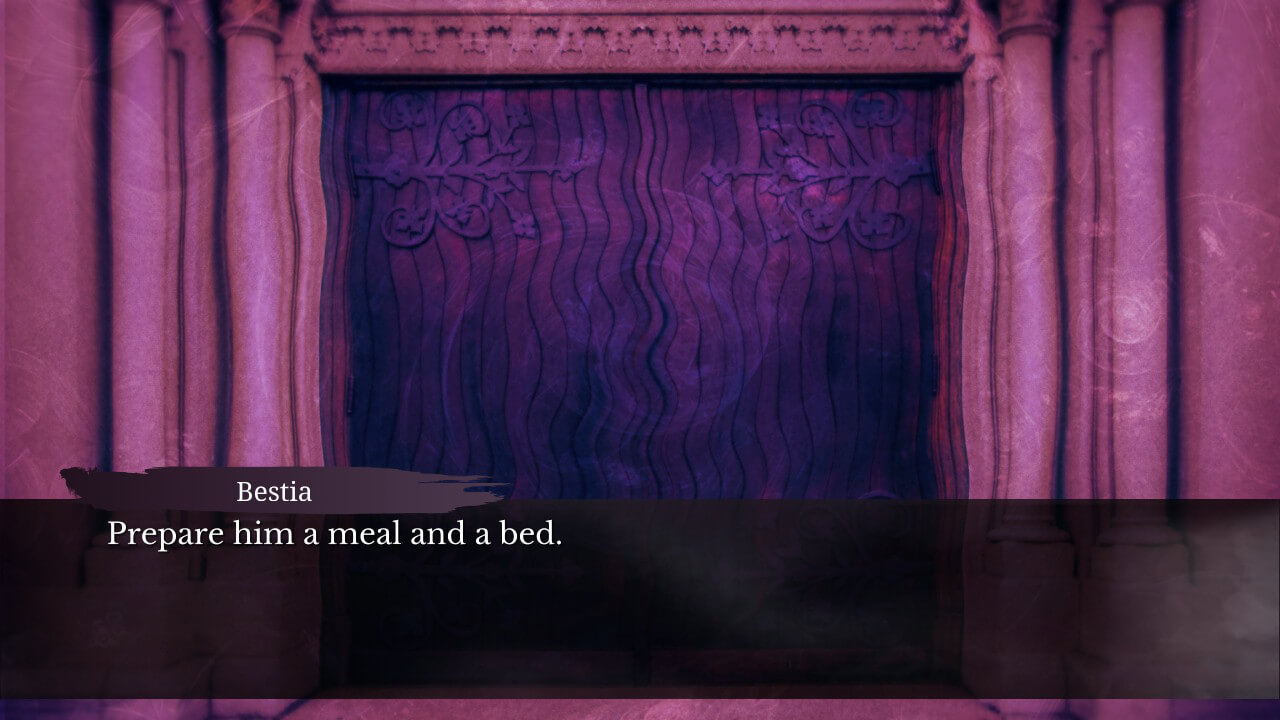
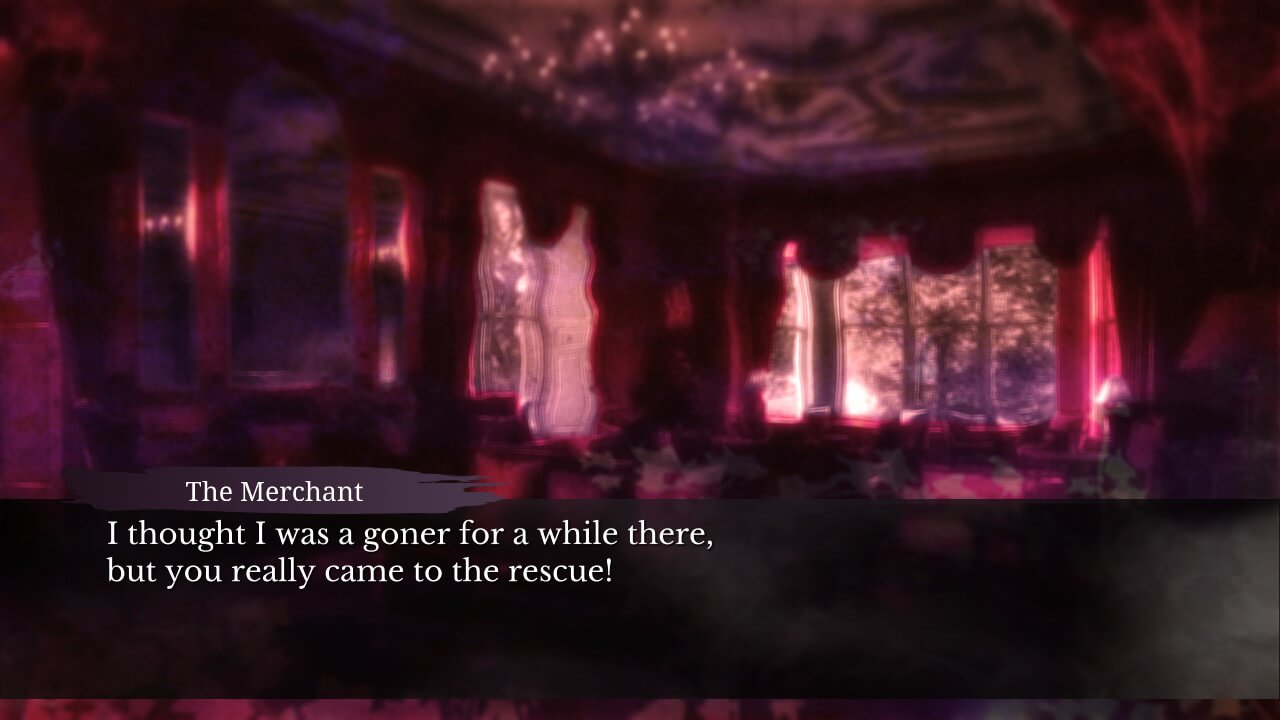
I like the new atmosphere from the beginning a lot! Very slow-paced and isolated, still very fairy-tale-like, but in a completely different register —now we’re getting threatening Gothic castles with monstrous owners. The eeriness of the manor becomes the main feature.
Bestia’s quiet days are really enjoyable to read through. But since this is still Fata Morgana, happiness is short-lived, and he ends up feeling reminded of his condition by a merchant’s comment. He gives in to his resentful, murderous impulses and murders all the visitors he gets at night. So much suffering ensues. At least until the white-haired girl’s reappearance.
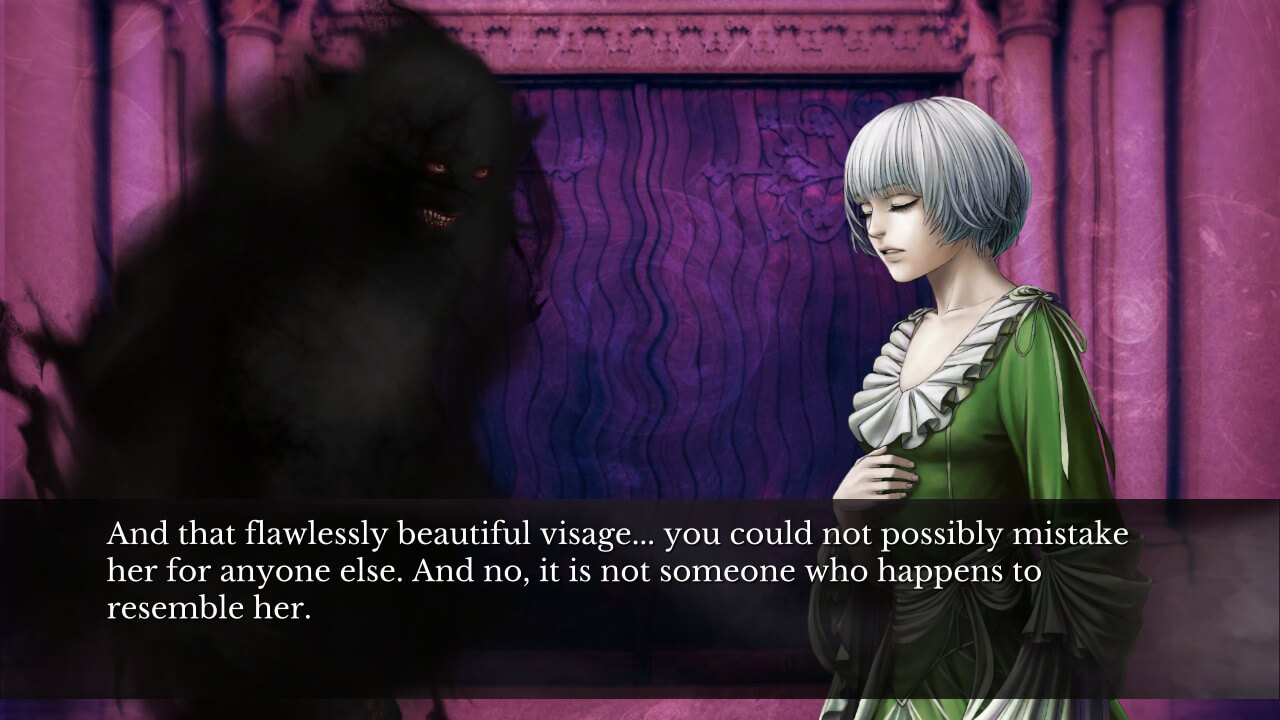
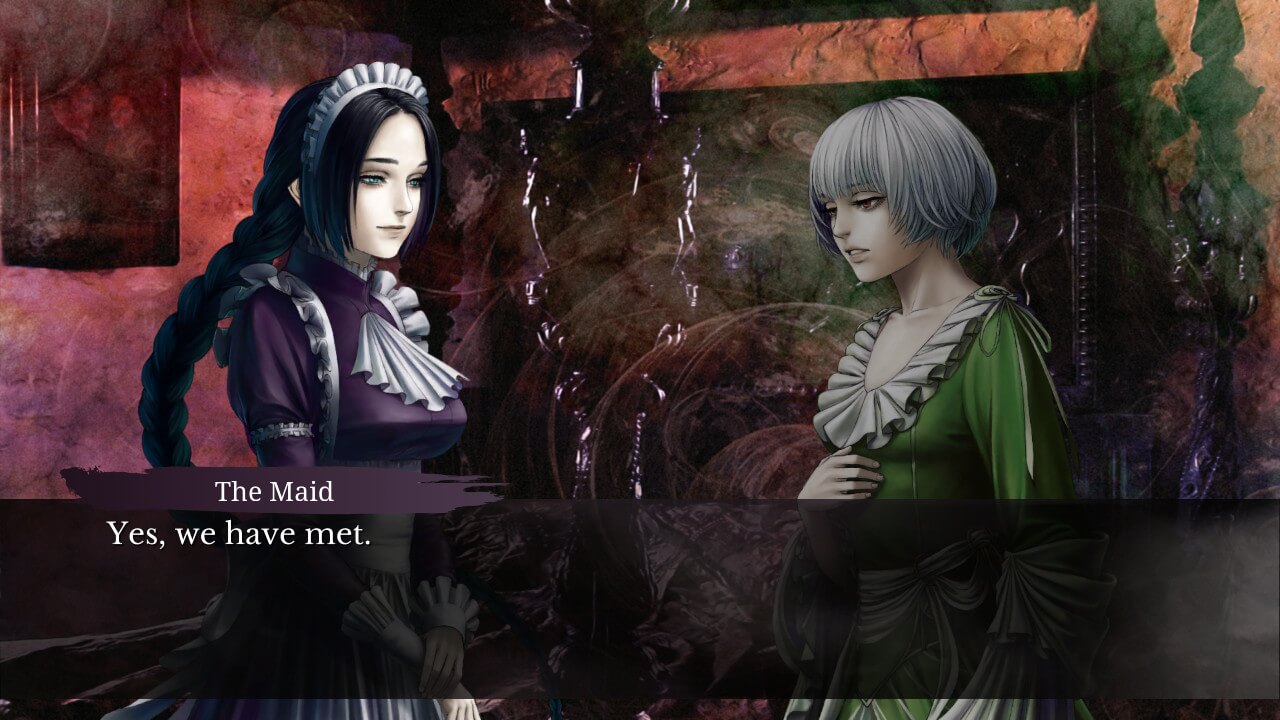 Due to the the amount of time which passed between both doors,
Due to the the amount of time which passed between both doors,
it seems this really is a case of reincarnation.
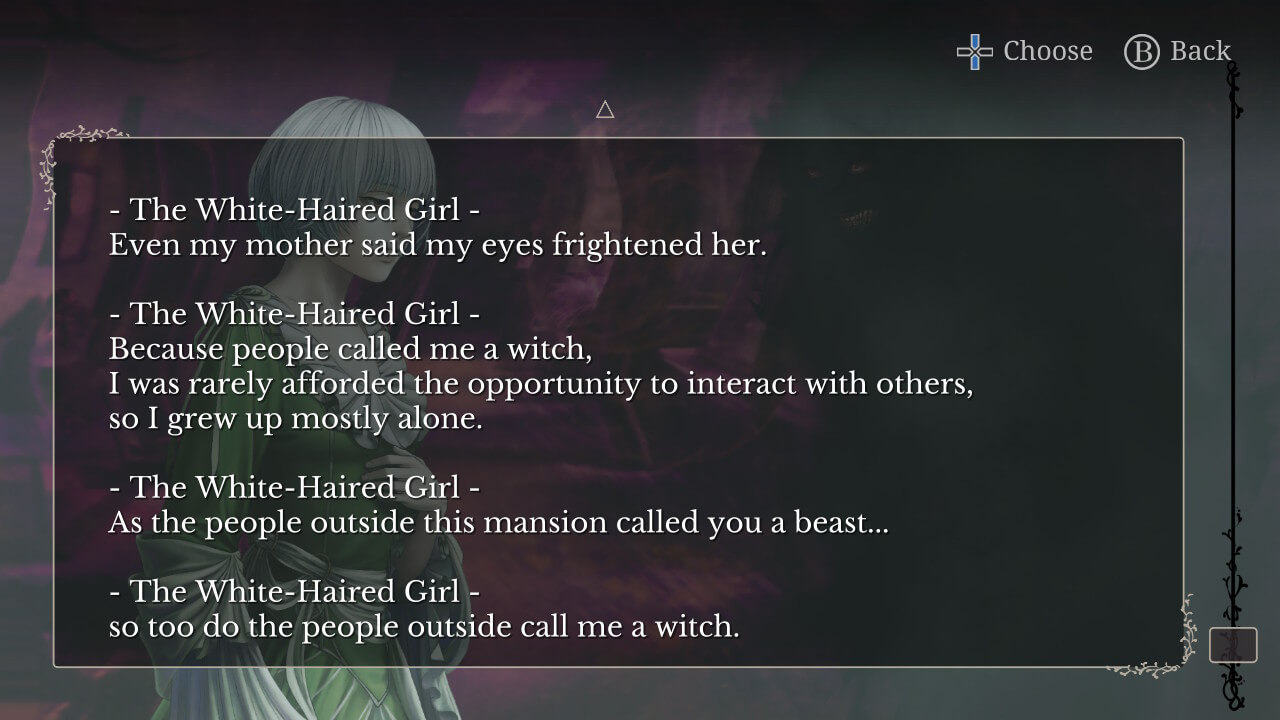
The relationship between Bestia and the girl is very interesting too. At first, it looks like a Beauty and the Beast-inspired healing romance with themes of ostracism, shame, and sense of self. It’s very encouraging to see Bestia regain humanity, though there are disquieting moments too —namely that he is entirely dependent on the girl’s attention, and degrades rapidly after killing the “other” beast.
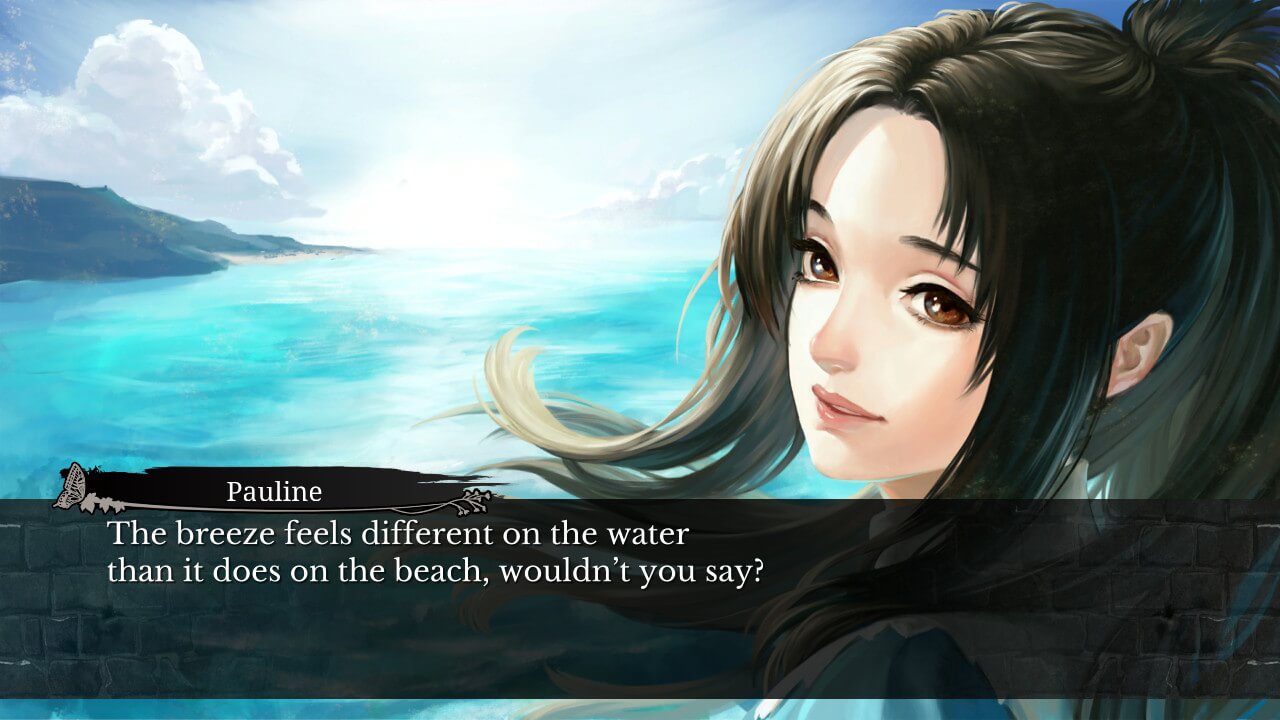
I love Pauline a lot! It is so, so hard to read through the flashbacks of her relationship with “the merchant” all the while initially assuming that he died at the hands of Bestia… Again with the classical folk story archetypes, the faithful sailor’s widow is just too cruel…
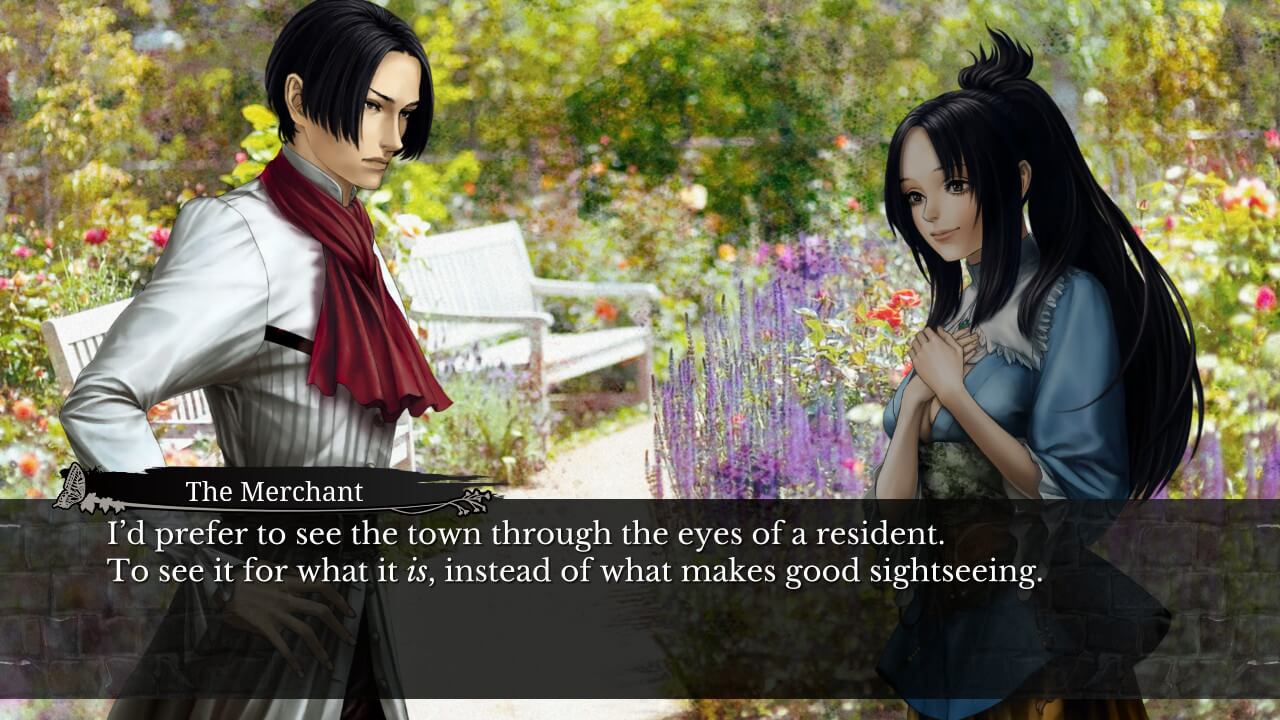
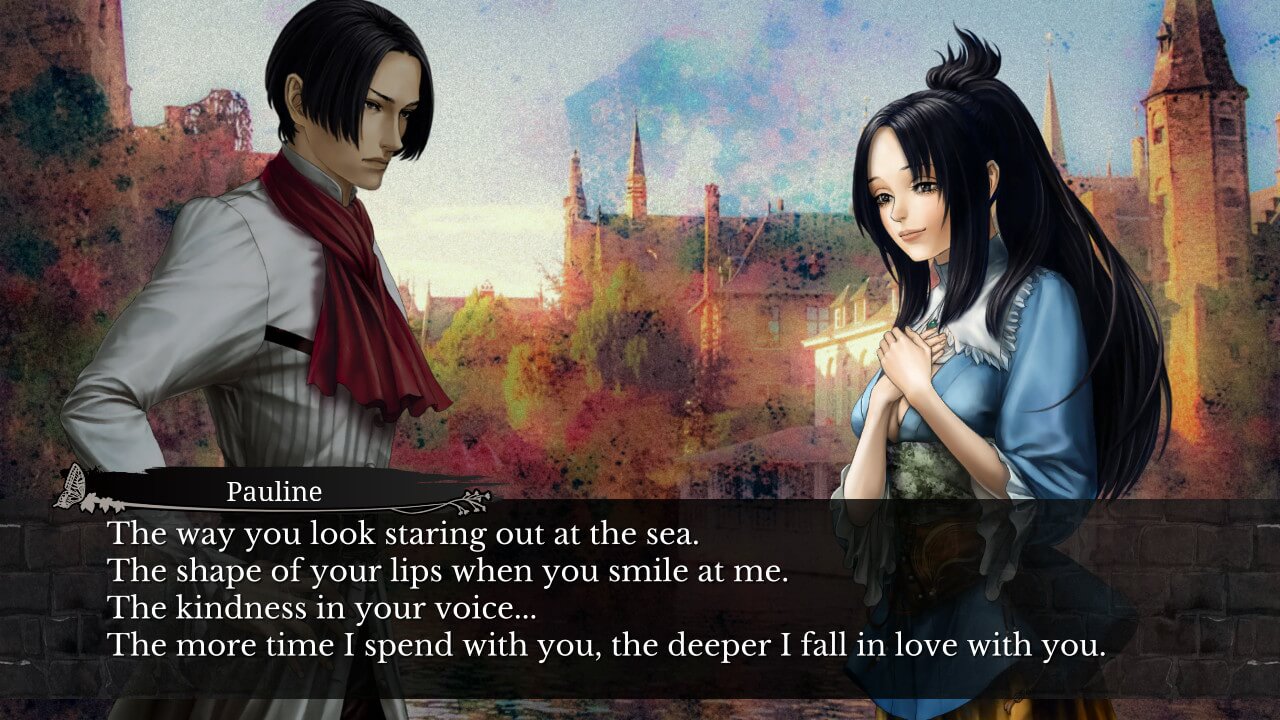
I like these two’s relationship a lot (initially)! The memory of her meeting with him in her hometown is especially sweet. It’s unclear from which French town Pauline is from, but I’m going to headcanon her as coming from Marseille (the biggest harbour on the Mediterranean coastline), though she could be from Normandy (Le Havre), or from Bordeaux. I initially didn’t realise or get the hint about her husband’s origins from the dress he offered Pauline, but was intrigued by his obsession with his homeland from the start.
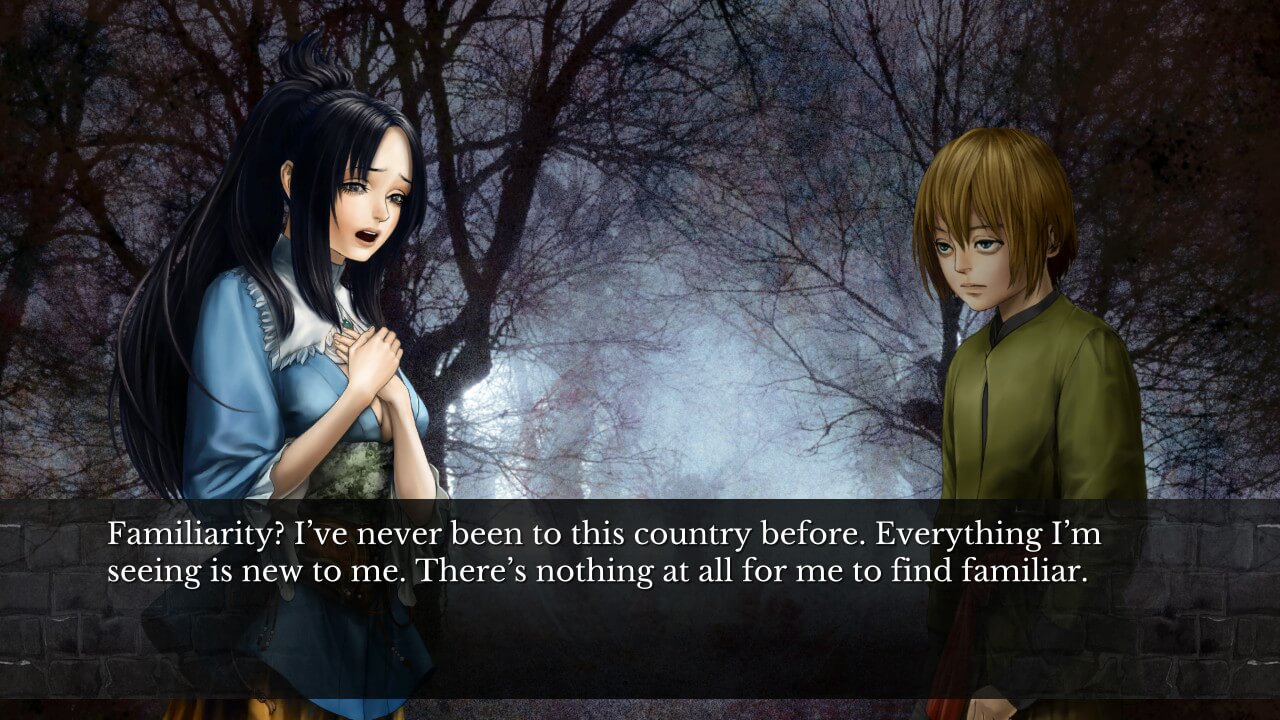 Uh… Does Pauline reincarnate too? Does she inherit memories somehow?
Uh… Does Pauline reincarnate too? Does she inherit memories somehow?
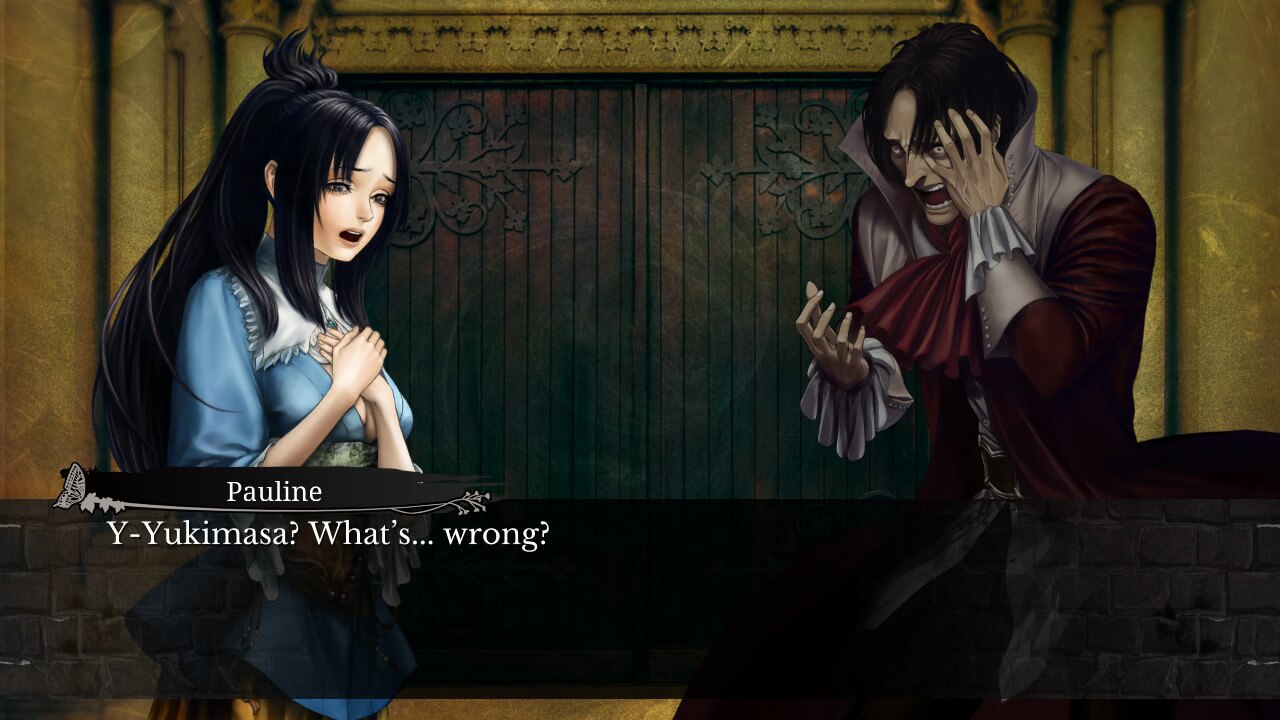
Bestia being Yukimasa… is so, so painful to realise. What an horrible end for Pauline. So much tragic suffering, this is worse than door 1 for sure.
I half-expected Pauline to be slayed by him because of the earlier slaying of the “other” beast, but I was still fooled. There’s something interesting about the white-haired girl being once more the “intruder” who disrupts the established relationship between the story’s male lead and another woman, with the jealousy felt by Pauline in her last moments.
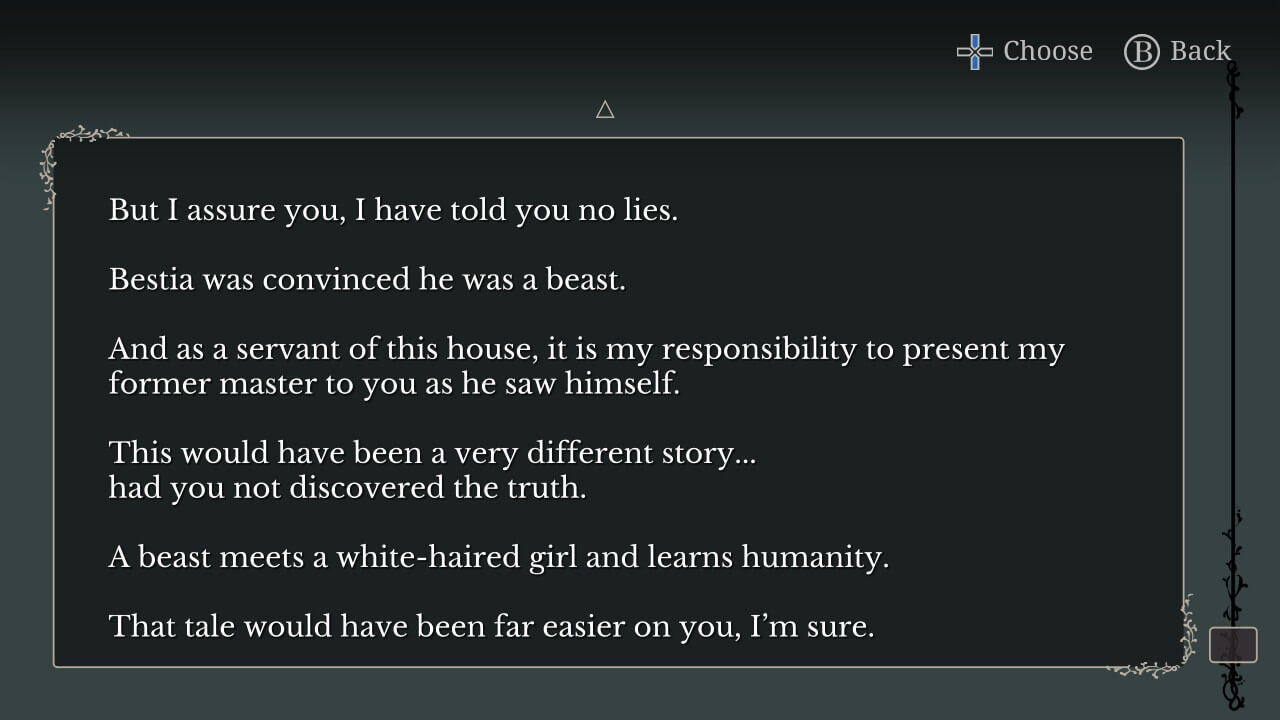
Using a beast sprite to represent Yukimasa’s self-image was very effective. It was obvious that something was up with it from the start, and it’s interesting that the Maid’s narration is responsible for this concealment of reality. This is definitely reminiscent of Umineko, but in a darker way. Wondering what her true purpose is by doing this.
The additional twist that Yukimasa was always concealing his murderous intents is… fairly cynical? It changes so much about the themes of the story up until this point, from something about shame and self-image to the story of a man who refused to confront his darker side. What kind of relationship would he have had with Pauline if she’d been able to stay together with him…
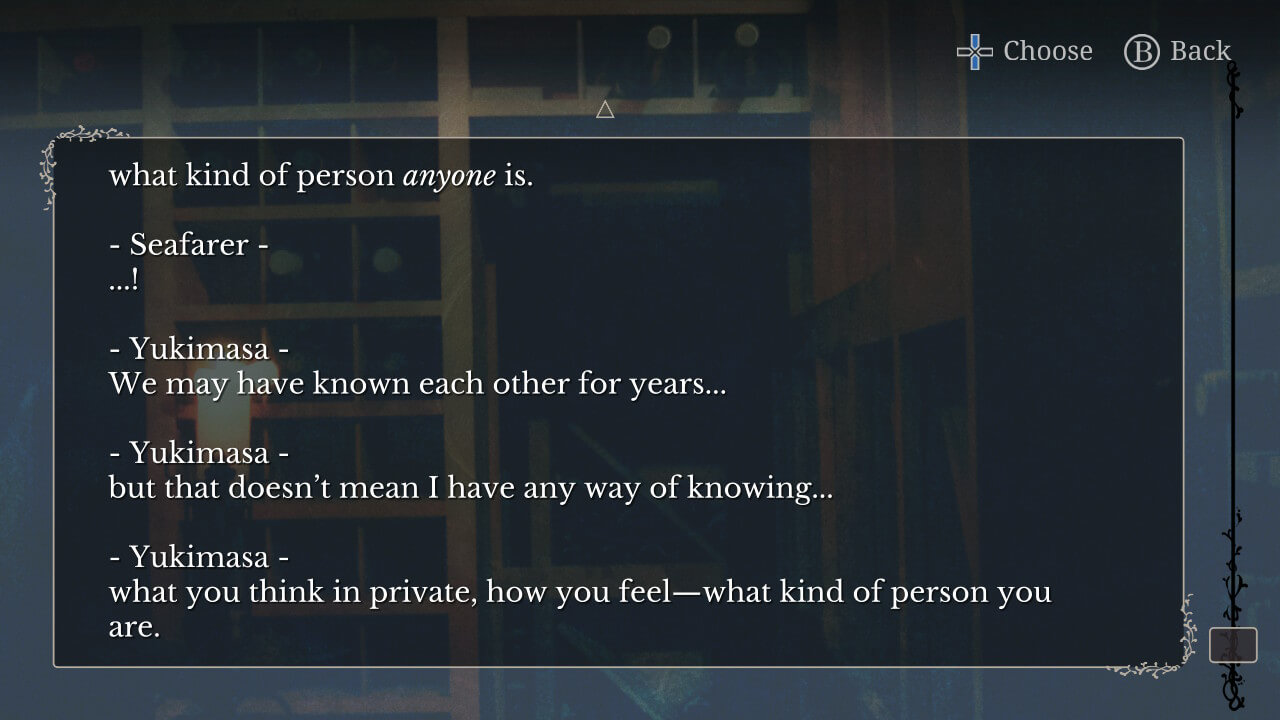 There’s a lot going on here, Yukimasa.
There’s a lot going on here, Yukimasa.
I’m really interested in the fact that part of his murderous intent comes from being Japanese but estranged from his homeland. This reminds me of a certain character in Rose Guns Days. You get the feeling he really treasures his katana, and (what he thinks is) his traditional samurai heritage, and places a disturbing amount of pride in that.
I don’t know much about Japan’s self-isolation from the outside world in this time period, but I wonder if there were many Japanese traders living abroad back then, and what their relationship with the homeland was.
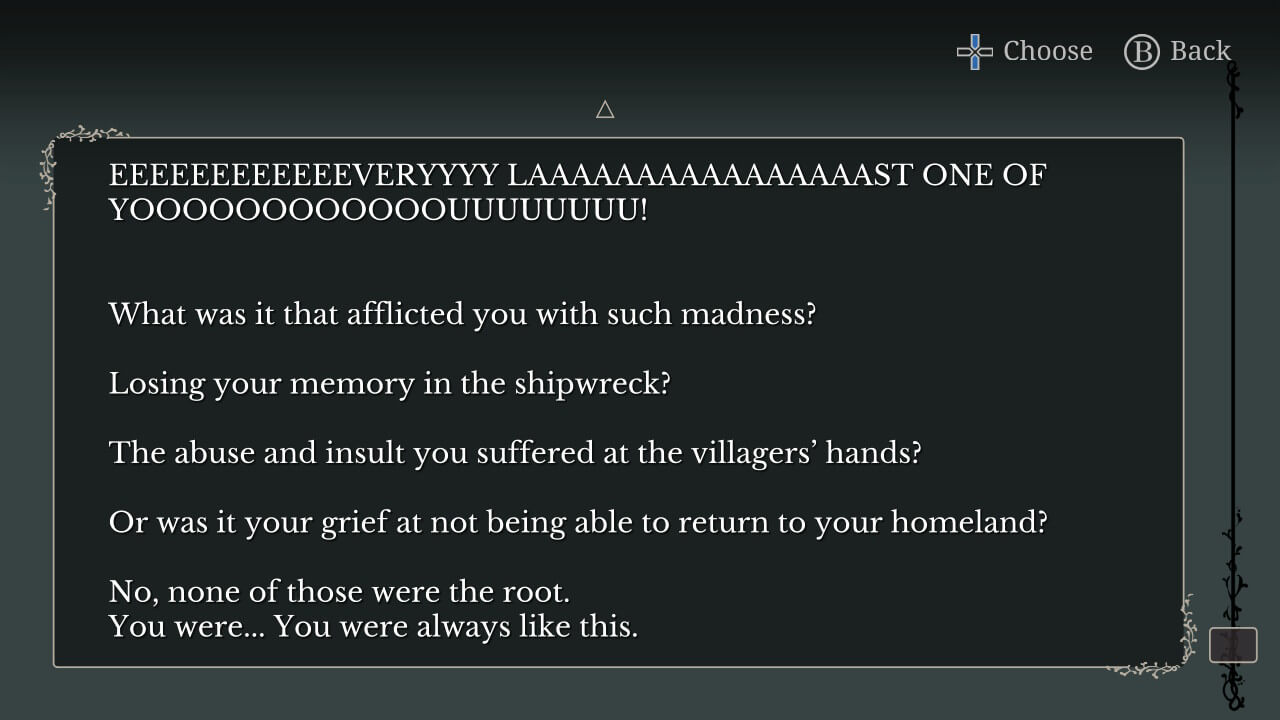
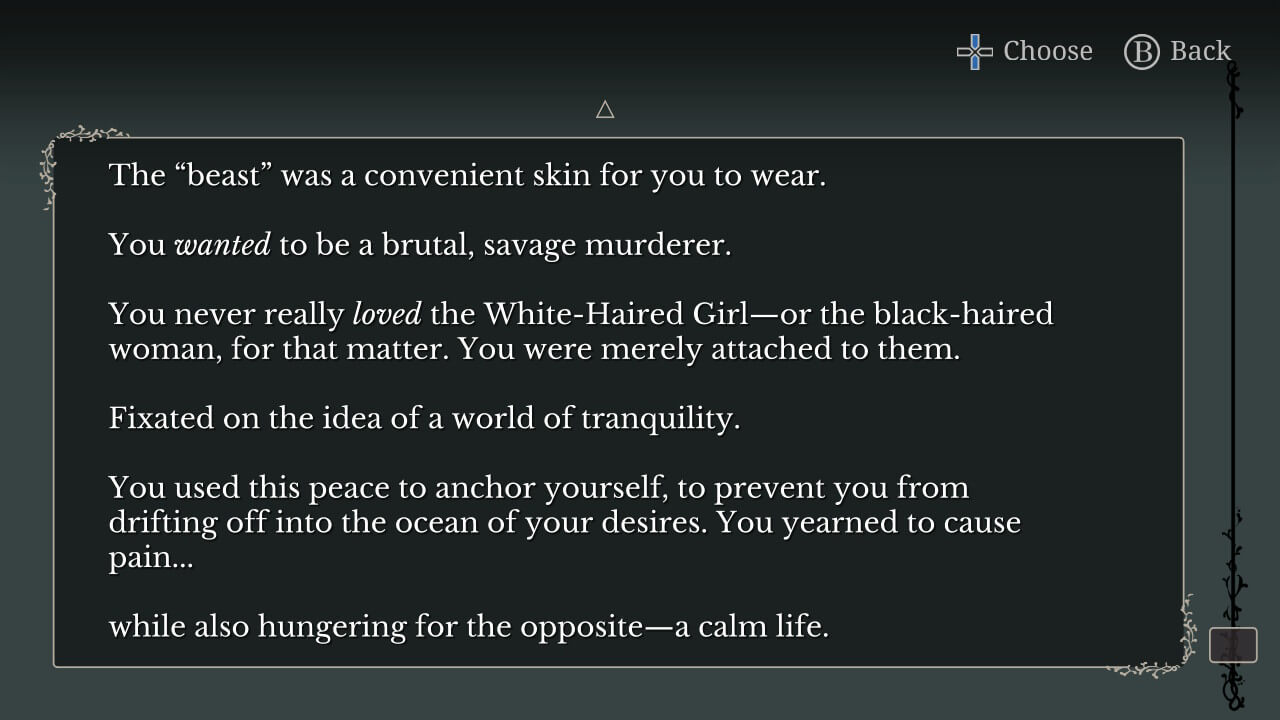
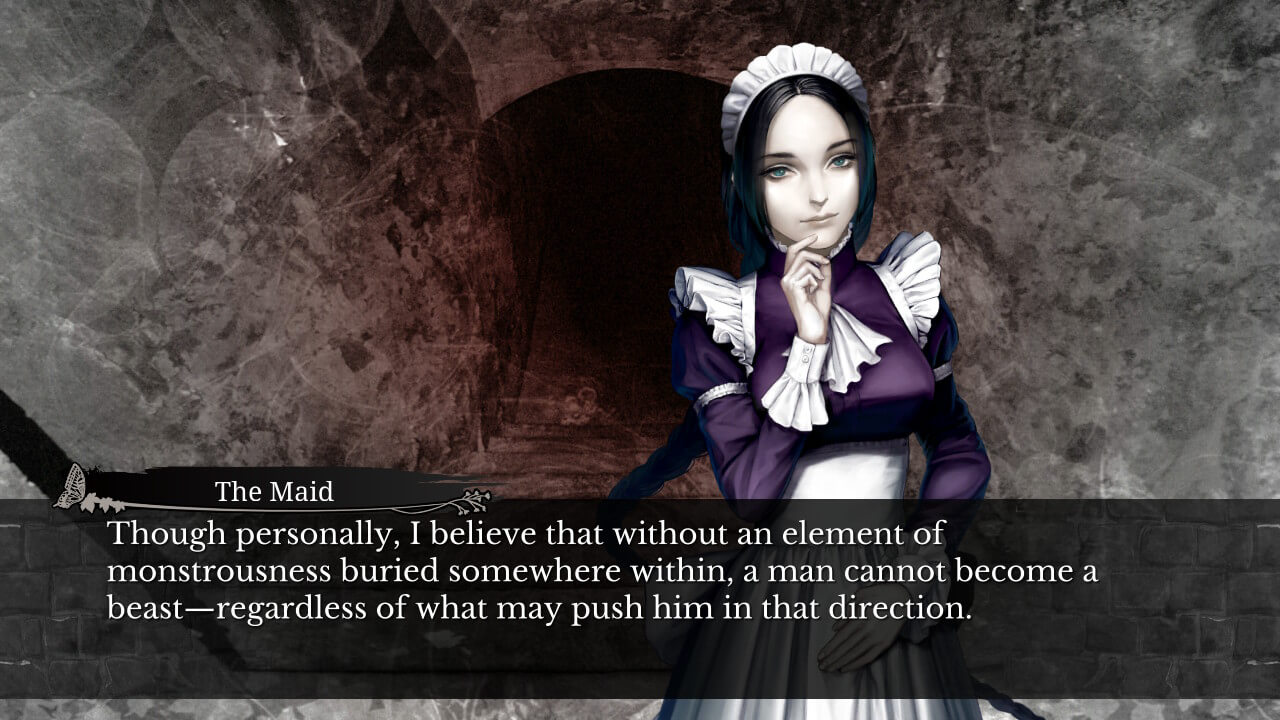
Again, the Maid’s comments on the story here are very explicit and in-depth, and, dare I even say… Resentful? At least, they’re admonishing, and address Yukimasa directly. Makes me wonder for a moment whether all the male characters don’t reincarnate too, whether they’re not the same person… but the Maid seems to acknowledge Mell and Yukimasa as their own persons.
Still, we get the same structure as in door 1, with a male character who falls short in some crucial way, and brings tragedy to the woman he loves. But the Maid’s resentment, or at least disappointment is so much more palpable here. Mell genuinely loved the white-haired girl, but couldn’t see the extent of the obstacles they’d have to face. Yukimasa merely referred to her as “his peace”, and never examined his murderous intent. There was never any hope to begin with (though I suppose the same could be said of Mell’s relationship because of their shared bloodline).
Still, this brings such a more cynical end to the story (especially with the destruction of the village). This tale is much, much bleaker than door 1.
Mirror Interlude
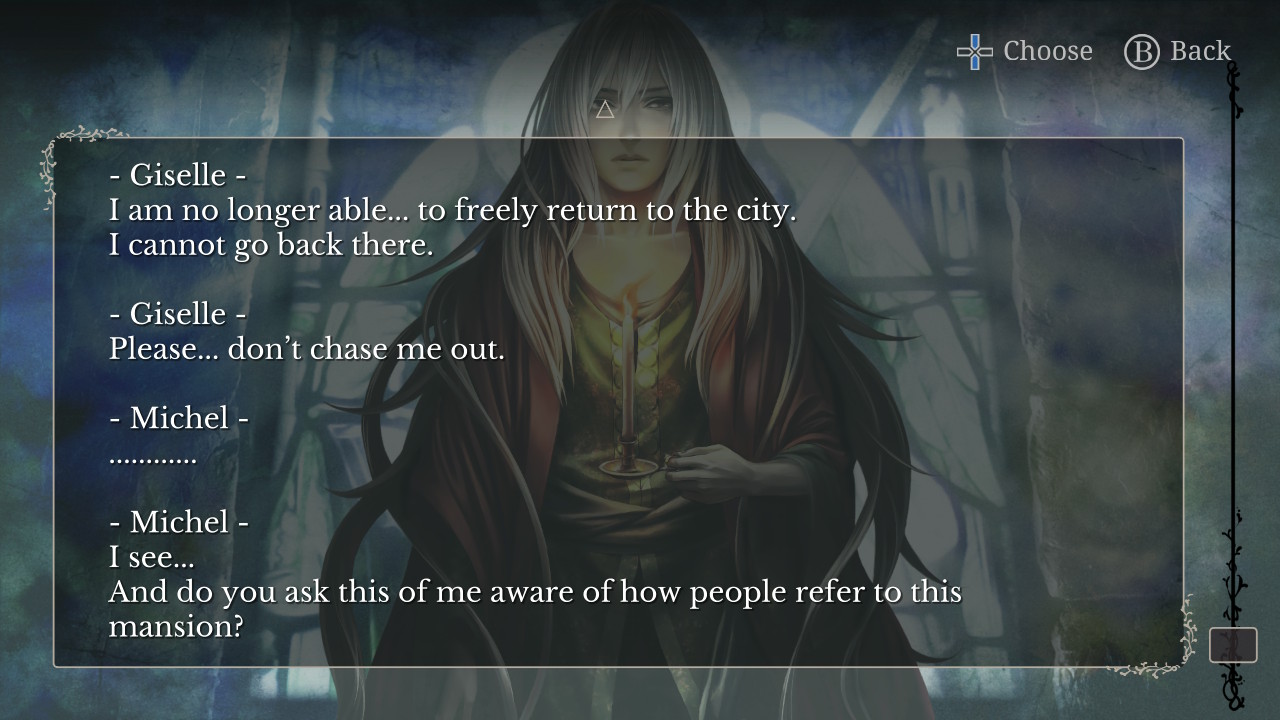
Oooh, so I finally meet Giselle and Michel, two characters whose names I’ve heard online, but know nothing about.
It’s hinted the Master has something to do with them, and has white hair, from seeing himself in the mirror for a second.
I start wondering whether there may not be two white-haired characters who reincarnate, Michel could be linked to the painter from door 1. We could be Michel.
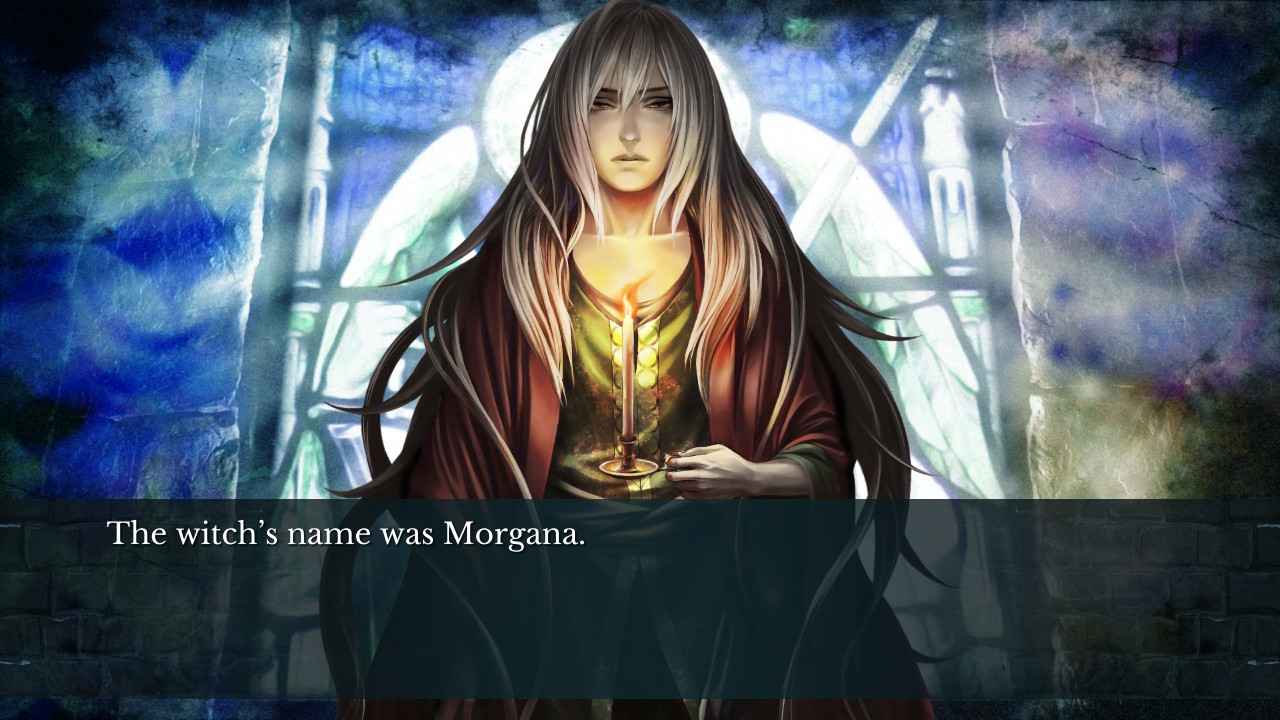
I also get some confirmation about a witch being named Morgana, though I still know so little. Exciting, this means much is to be discovered!
Third Door
There he is! The one character I knew by looks before even starting reading this story, the VN sphere’s most fragile male ego, the one and only Jacopo!
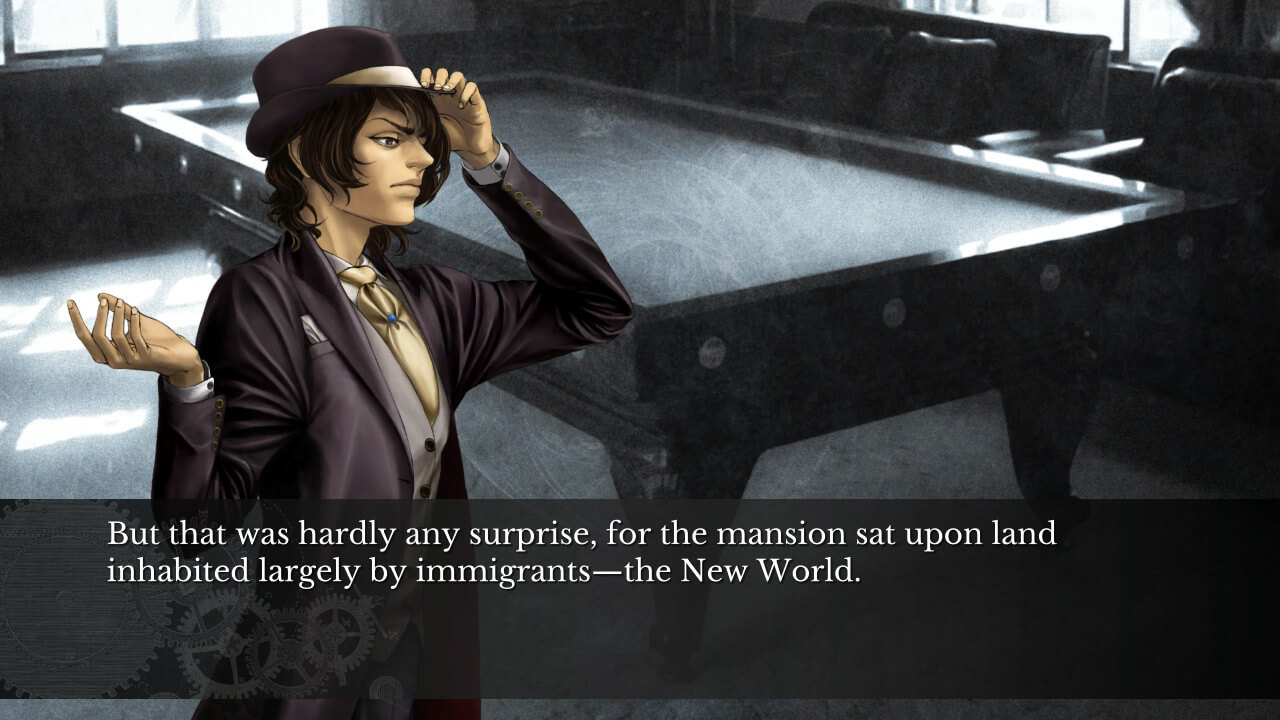 The manor transferred to America, yeehaw!
The manor transferred to America, yeehaw!
What a change of atmosphere. I can only admire the attention brought to speech mannerisms and historical mood behind each door, everything here was so believable.
 Of course, he is casually racist.
Of course, he is casually racist.

To be honest, after the scene was set and Jacopo’s most distasteful traits were introduced, I wasn’t sure whether I would end up caring for such a magnificent bastard. We were clearly heading down the abusive marriage route and well, this would be an uphill battle.
And yet I ended up really loving this door a lot too.

This was the saddest iteration of the white-haired girl yet, and there was little hope she would be able to attain any happiness. It’s interesting to see how her specific circumstances may change, but she always retains the same traits —isolation, a tragic past— and yet she still places some initial amount of trust in her male partner (I’ve been going through door 4 while writing this, and it makes this aspect even more explicit).

The 19th-century setting makes Jacopo so much more real than Mell’s chivalrous spirit or Yukimasa’s adventurous background. I’ve seen countless men like him in fiction —hell, I’m pretty sure I’ve met people in finance with that vibe. He’s the first modern man of the story, and it’s easy to see where he comes from and even to relate at times.

There is something endearing about the one moment of romance he shared with his wife. It’s terrible and very painful to see her hang to that distant memory… but I get it all the same.
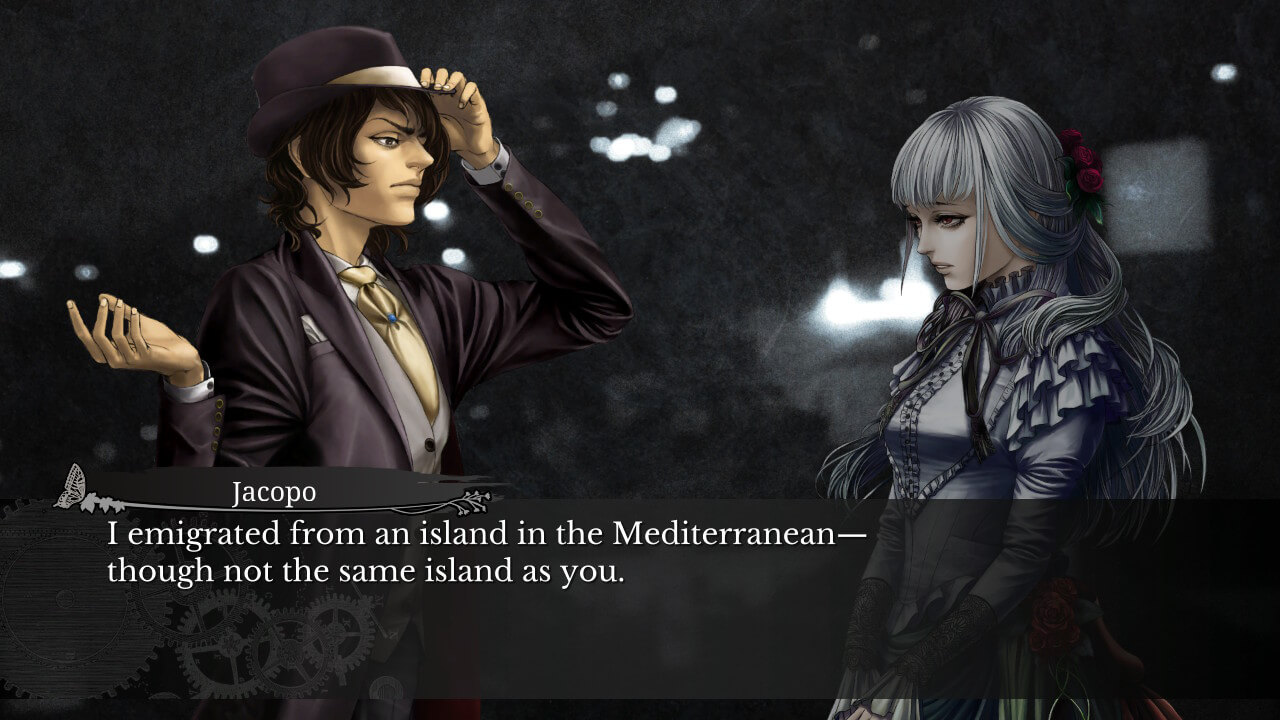 The Sicilian Mafia background makes a sharp change from the fairy-tale atmosphere of the previous tales.
The Sicilian Mafia background makes a sharp change from the fairy-tale atmosphere of the previous tales.

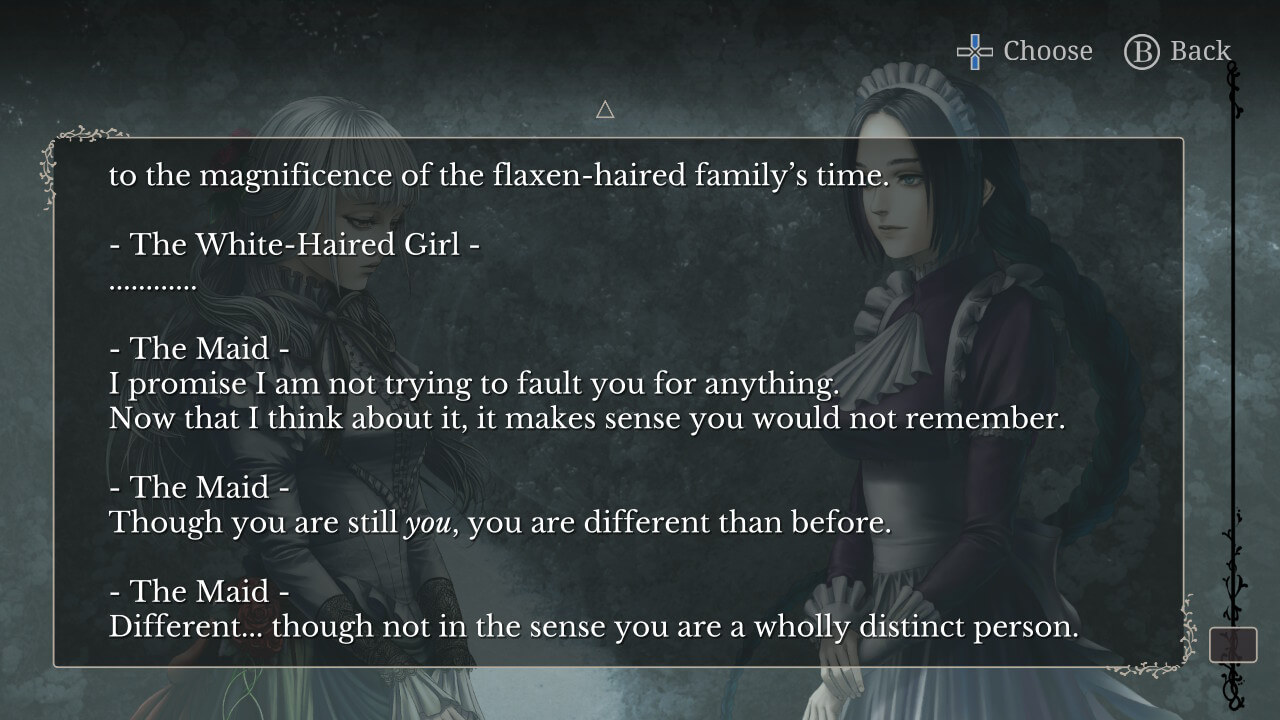
The re-encounter between the girl and the Maid make me think that she could be the Master? After all, she continuously loses her memory behind the doors, much like the amnesiac Master in the manor. I was initially thinking the Maid was (covertly) antagonistic to the Master, but this may be more complicated.

This was without doubt the hardest door to read yet. The abuse is fairly unbearable and ever-increasing, and at first you can only greet your teeth, thinking this can only end one way.
The Maria twist took me completely by surprise, much like in door 2… At first, it seemed very cynical, almost like a kind of bad deus ex machina: by putting the blame on Maria, “fate” or bad luck would become responsible for the white-haired’s descent to hell, and not Jacopo.
But the turn taken by the story ended up being more interesting and nuanced than expected! Mostly because of the amount of attention brought to Jacopo’s angst and insecurities:
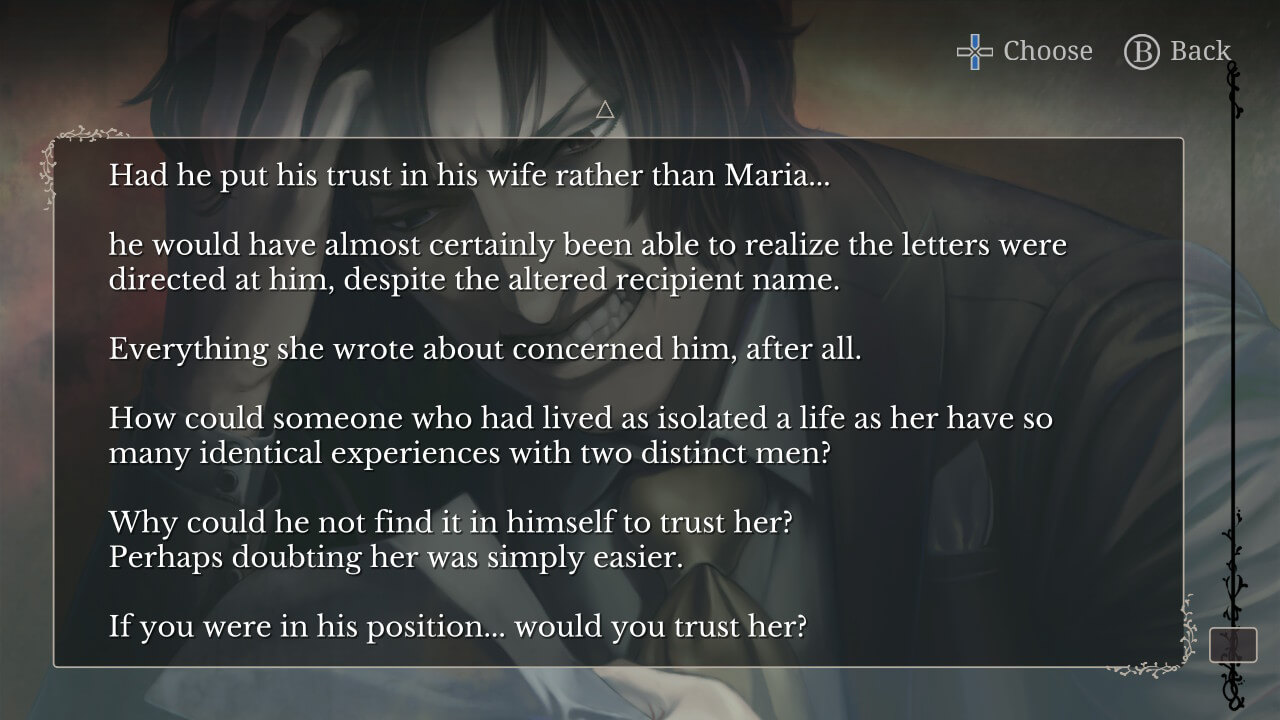
Maria does an awfully bad job of portraying his wife as unfaithful in the letters she alters. The white-haired girl is incredibly specific in her love, and mentions memories Jacopo should intituively recognise. He should have realised they were forged immediately, had it paid any attention to their actual content, instead of dwelling on his fears. So much of the tragedy stems from his inability to trust her and move beyond these fears, in spite of the genuine feelings he had for her. You get the sense that it was possible for Jacopo to do better, in spite of everything.
The discrepancy between the final dates each of the spouses has set as ultimatum works so well for the same reason: while Maria’s responsible, the fact that Jacopo’s resolve took this long to reach this basic point is very, very obvious.
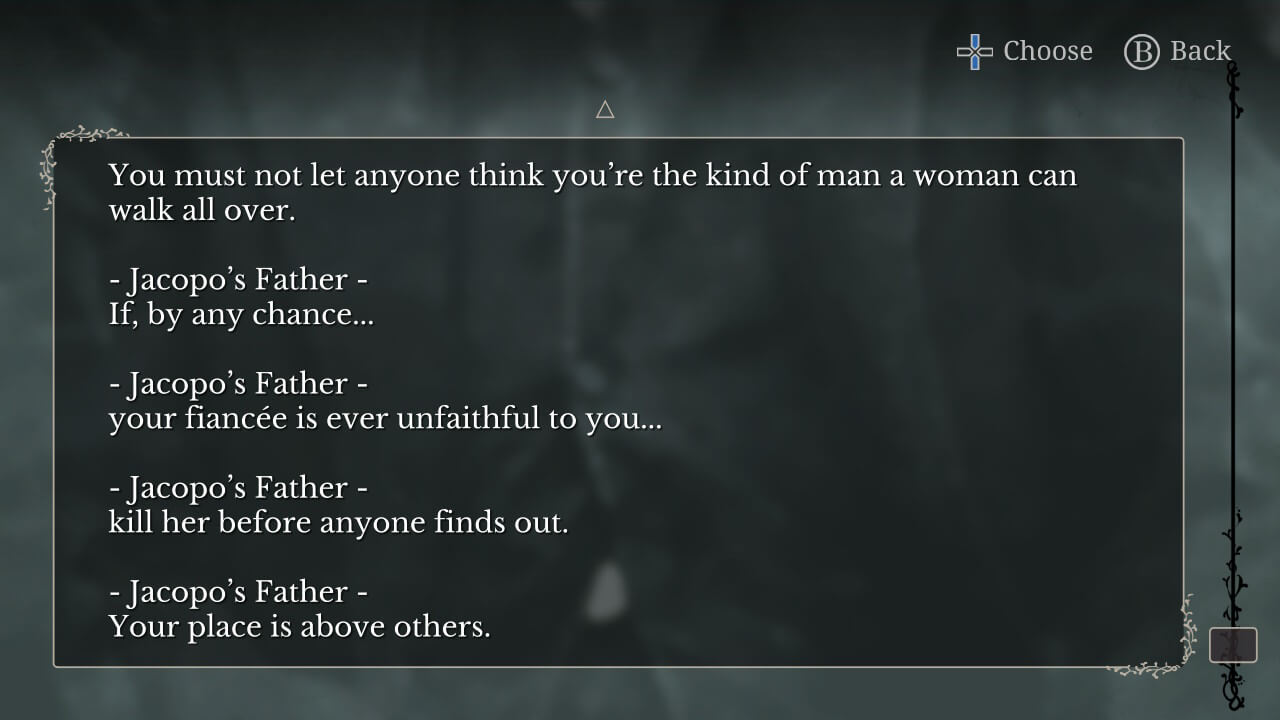
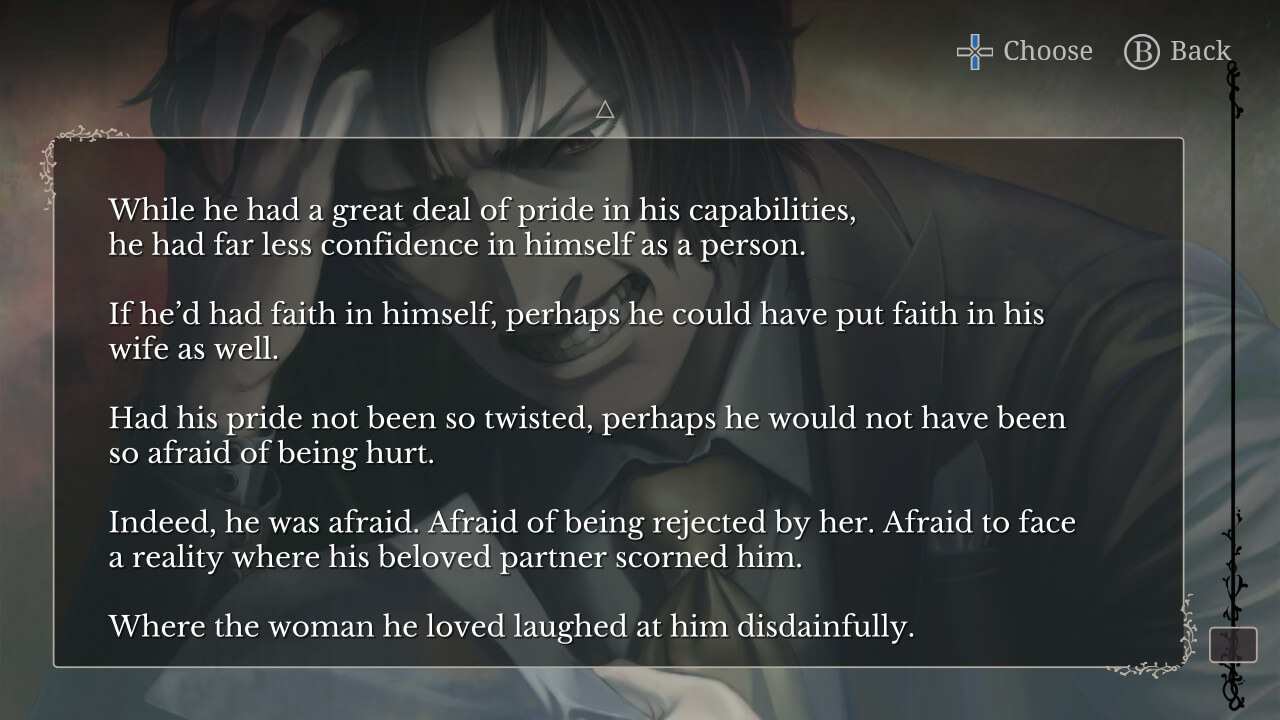

The Maid is as explicit as ever with the moral of the tale, and Jacopo’s final epiphany that he is the one to blame for his wife’s utter suffering and breakdown is just perfect. I think I get the appeal behind the character now, his angst is far too good. It hits even more than Mell’s own unfortunate love, because Jacopo truly becomes aware of what he lost for seeking only pride and power.


Again here, I’m influenced by reading door 4, but I like the theme of love’s healing power. There’s little to salvage from Jacopo and his wife’s relationship as it stands, but you still get a sense that something different really was possible, although he squandered it all. It’s very, very different from the endless suffering I expected from the first scene.
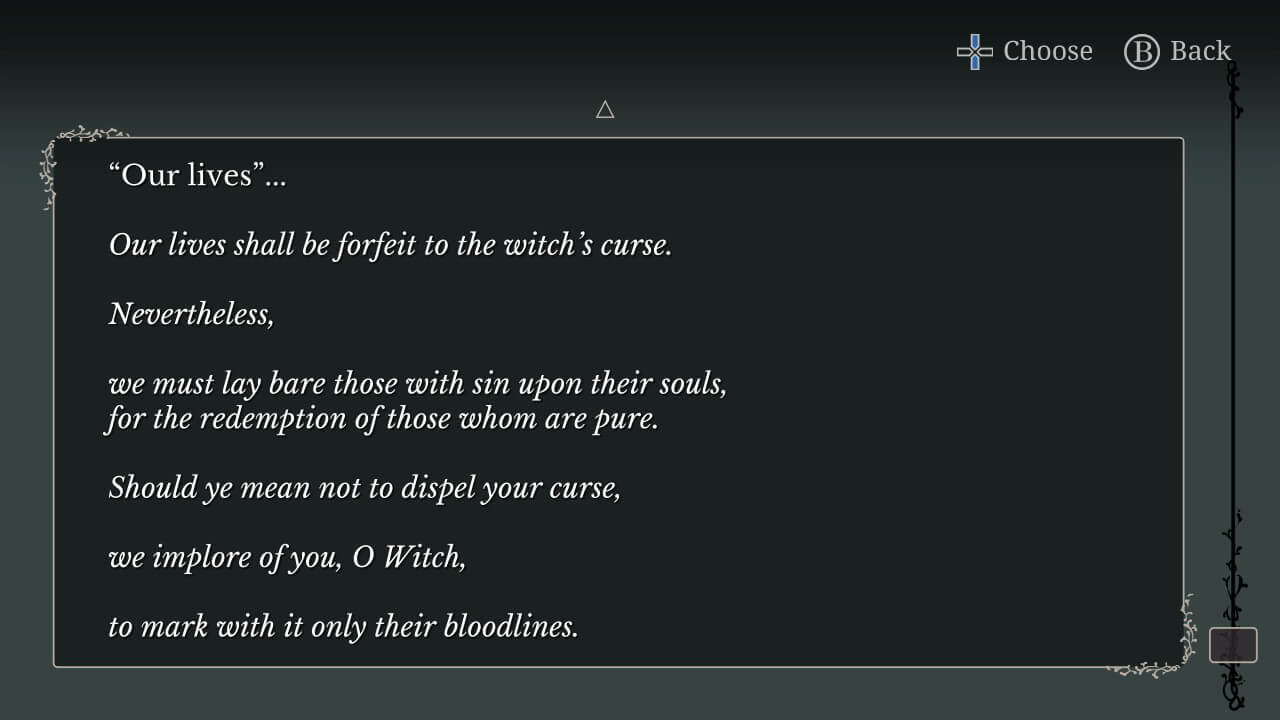
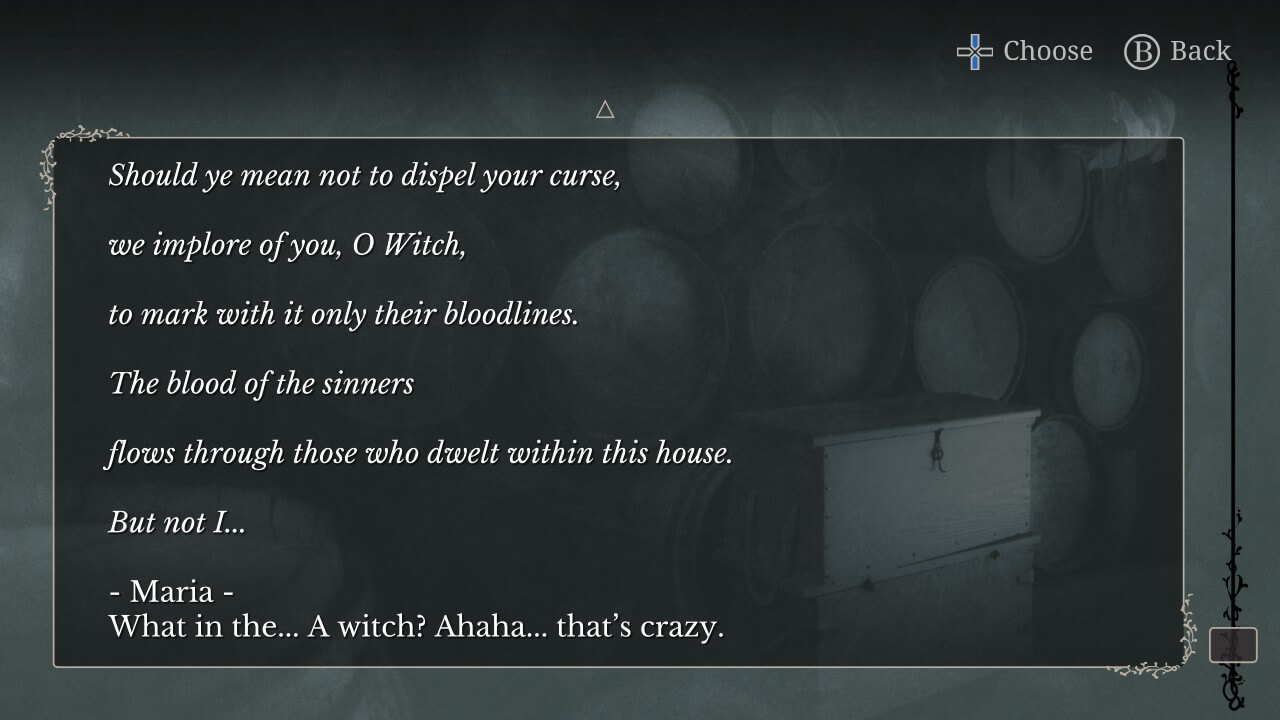
Returning to Maria for a bit, I have a lot of questions about her discovery of the curse. The mention of bloodlines seems to suggest that two different people are to be marked and ruined, but not the person invoking the curse. This seems to track with door 1, where Nellie invokes the curse on the half-siblings, and with this door, where Maria plays the same role. She even seems to share the same motivation, since she hints that had she been a boy, she could have carried on her family’s tradition, instead of simply giving in to resentment and revenge.
Does the curse mean that Mell and Jacopo share the same bloodline? I’m not sure and mostly doubt it, but at least the pattern is very clear.
What comes next?
I’ve been reading through door 4 and I like what I’ve seen of it so far! I’m not sure fully sure when or how I’ll update next —formatting this post, transferring screenshots and remembering my thoughts from previous doors was surprisingly more involved than I expected.
Maybe I’ll focus even more on screenshots, or I’ll make sure to post shorter updates after each chapter. Hope this was interesting to read! I like everything I’ve read so far, and I’m excited for what’s to come next!
